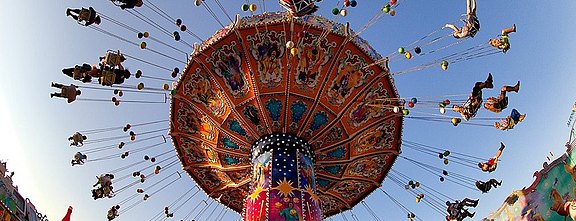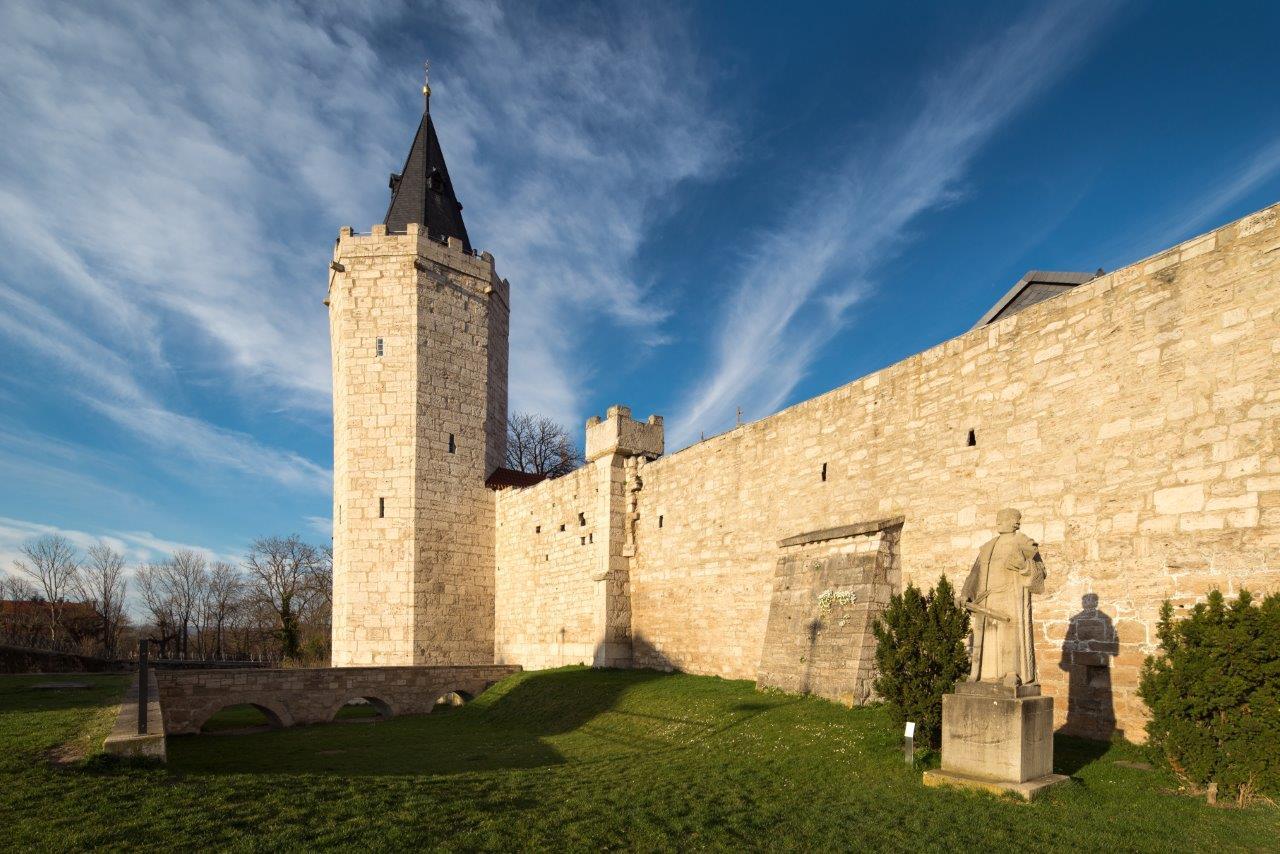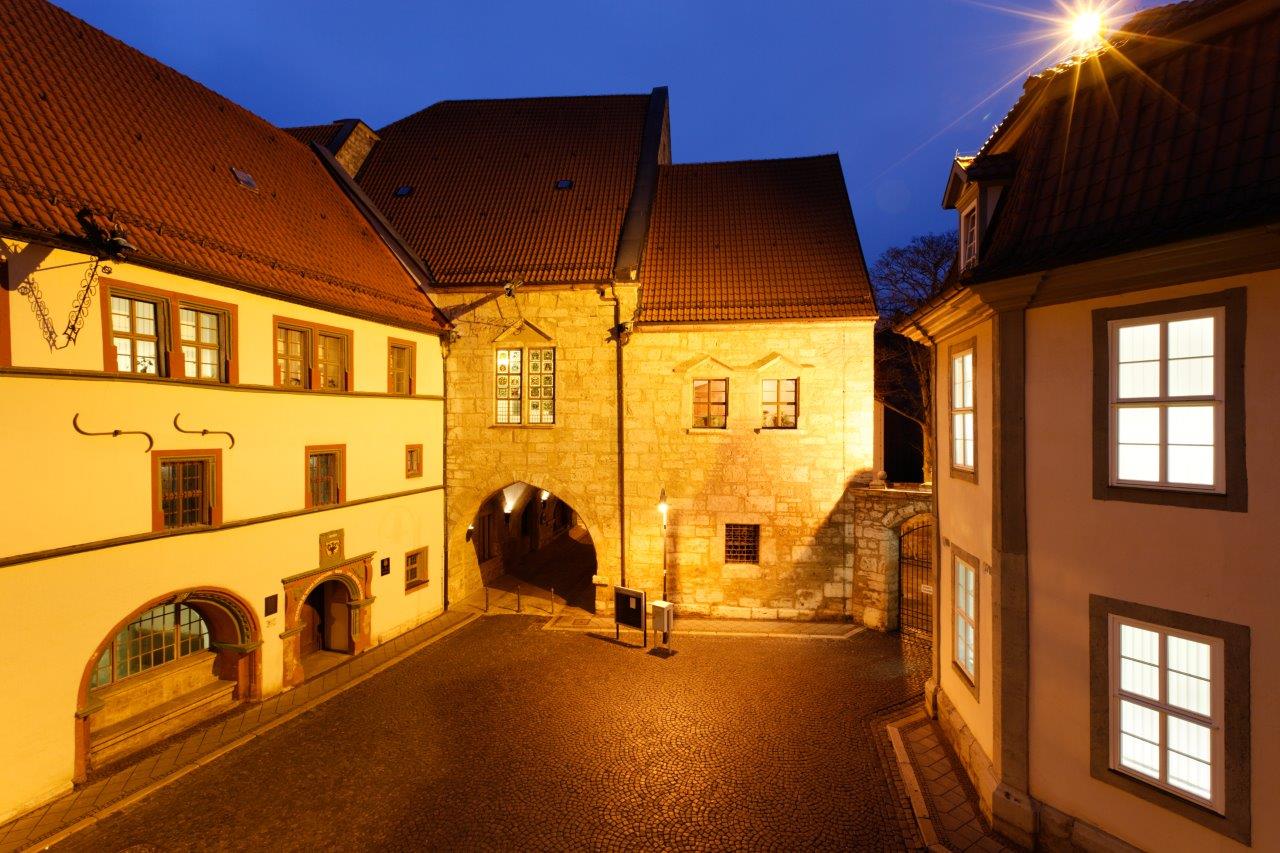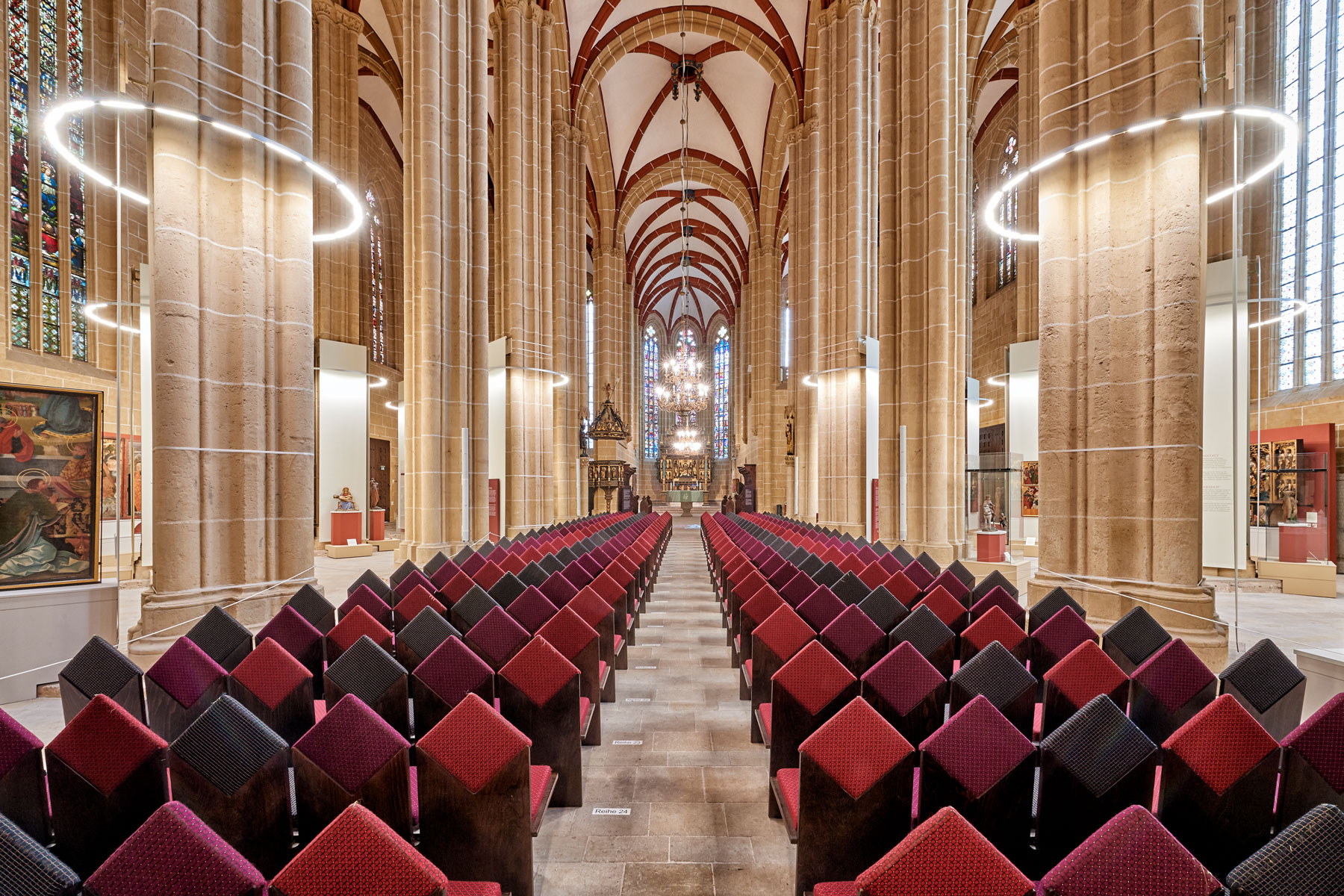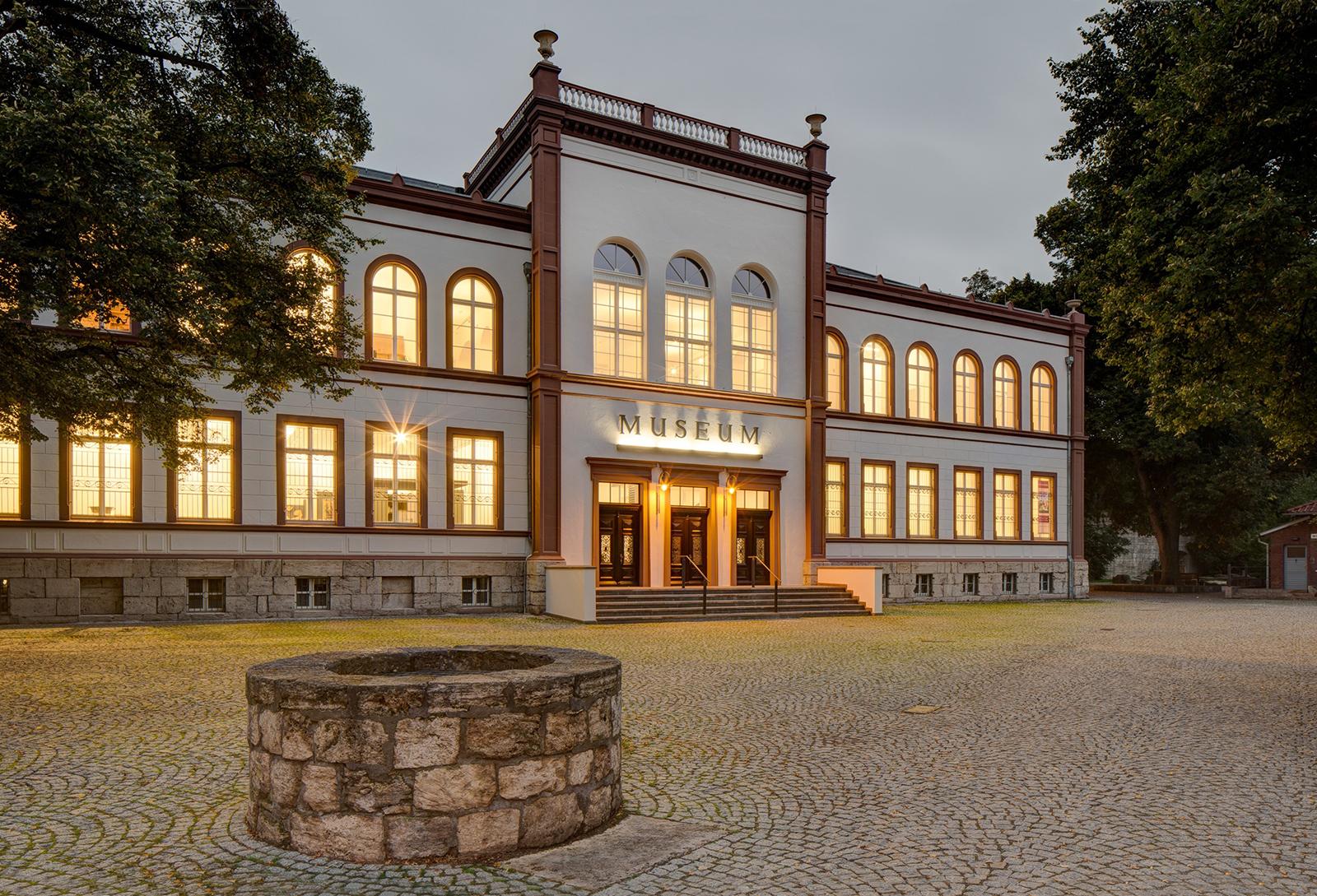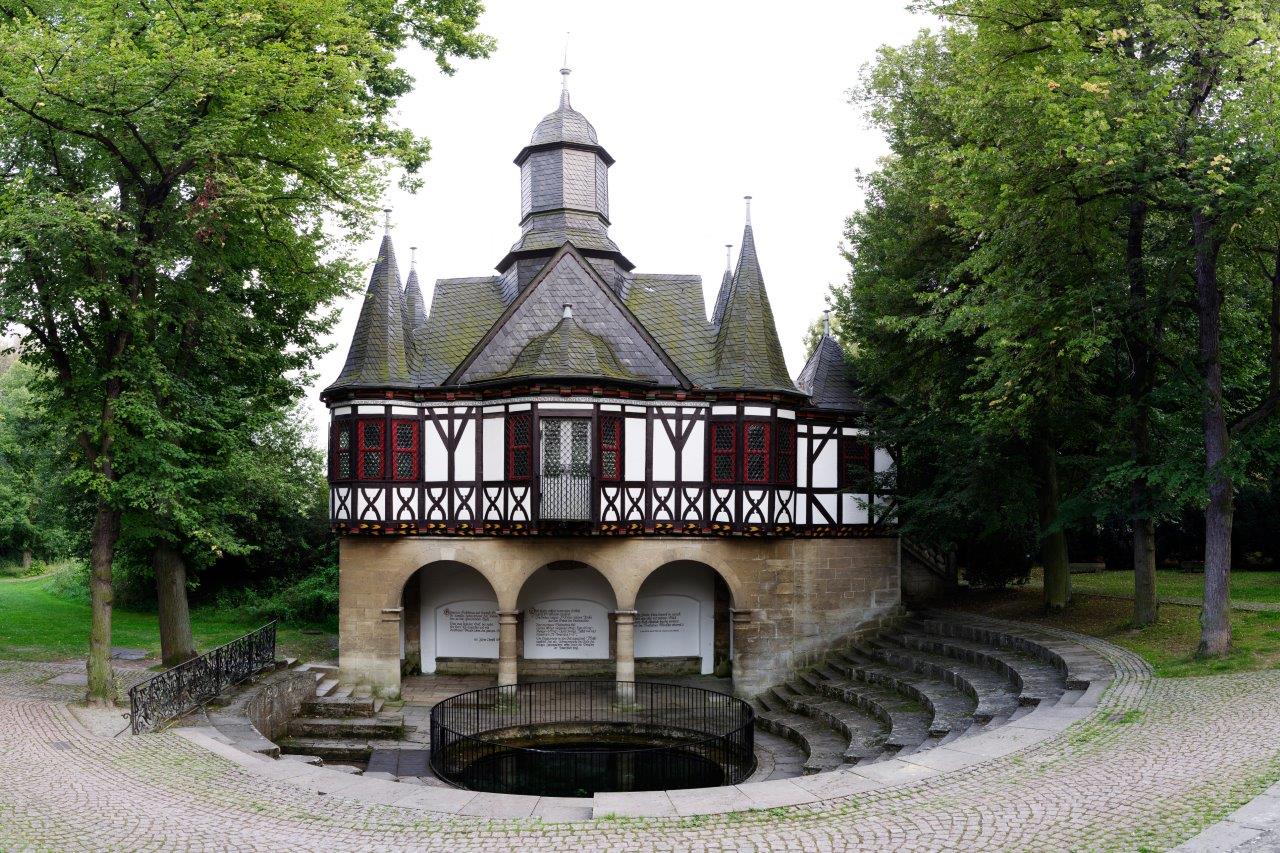Peasants' War memorial stone at Rieseninger
The monument made of 200 hundredweights of shell limestone was erected by the Mühlhausen Beautification Association and inaugurated on July 14, 1901. The inscription on the valley side was changed twice in order to rededicate the original "Peasants' War Memorial Stone" as the "Thomas Müntzer Monument" in 1953 and to adapt it once again to the historical image of the GDR in 1975.
When the Rieseninger Berg was redesigned as a town park on the initiative of the Mühlhausen Beautification Association, the "Peasants' War Memorial Stone" was erected on the northern slope in a frame typical of the time. This was the first time that the events of 1525 and in particular Thomas Müntzer (ca. 1489-1525) were permanently commemorated in a public space in the town. The text of the inscription on the valley side was designed by the grammar school professor and town historian Reinhard Jordan (1847-1916):
In memory
of the
Peasants' War
and the unfortunate year
of Mühlhausen
1525
On this hill
the heads of the leaders executed at Görmar
executed at Görmar
Thomas Müntzer and Heinrich Pfeiffer
were impaled
Erected by the Verschönerungsverein
of Mühlhausen
at the foundation of the town park
1901
At the inauguration on July 14, 1901, the dignitaries of the association explained that they had "not created a monument [...] to glorify the deeds of those blinded, violent masses and their fanatical leaders" (town councillor Max Langhammer, 1856-1940). It was expressly intended that "the memorial stone erected should not in the slightest glorify the Peasants' War and its leaders, who brought so much disaster, misery and humiliation to our home town, but only record and mark the historical episode and bloody final tragedy of the Peasants' War that took place in the areas surrounding us" (association chairman, farmer owner Gustav Weymar, 1843-1903).
During the Weimar Republic, the site and its memorial were nevertheless adopted by the organizations of the workers' movement in order to demonstrate their contrary view of history at events held there in May 1925 to mark the 400th anniversary of the German Peasants' War, in which Thomas Müntzer in particular was stylized as the champion of their own cause.
The nationwide veneration of Müntzer, which began in 1949 with the founding of the GDR, increased identification in Mühlhausen with his person and his work in the town in 1524/25. The "Thomas Müntzer Battle Week for Peace" from 25 to 31 May 1953 was then the reason for the renaming of the Rieseninger to "Volkspark Thomas Müntzer" and for the removal of the original inscription on the monument. It was replaced by a new memorial plaque on May 27, the 428th anniversary of Müntzer's death:
Much blood was given
since Müntzer's bold deed;
the German people shall live
and the seed grows magnificently!
KUBA
Thomas Müntzer
the revolutionary
peasant leader against
feudalistic oppression
and exploitation
who established the eternal council in Mühlhausen
council in Mühlhausen and proclaimed the
proclaimed the People's State in 1525
The introductory verses were taken from the poem "The New Germany" by the poet KuBa, alias Kurt Barthel (1914-1967), which was dedicated to the GDR.
The celebrations for the 450th anniversary of the German Peasants' War in 1975 in the GDR, which were celebrated in Mühlhausen with "Thomas Müntzer Festival Weeks", meant that the 1953 inscription no longer seemed appropriate. A new plaque was unveiled on July 4:
"Violence shall
be given
to the common people"
Thomas Müntzer in the year 1525
His far-reaching ideas
far-reaching ideas
were recognized by the
working people in the
German
Democratic
Republic
realized today
According to a report in the daily press about the inauguration by Mayor Karl Saul (1919-1977; official from 1973-1977), he "emphasized in his speech that Müntzer's dream of establishing a free people's state has become reality in our socialist republic, and he recalled the traditions of the working class, which, among other things, honoured Thomas Müntzer with a meeting of the Red Front Fighters' League at the same place in 1925." The new inscription modernized the image of Müntzer in accordance with the GDR's understanding of the state, which had changed in the meantime. It fully corresponded to the official interpretation of history at the time, which was not corrected until the end of the "first workers' and peasants' state on German soil", which presented itself as such. As a result, the inscription on the monument in the park outside the town was not redesigned when the 500th anniversary of Thomas Müntzer's birth was celebrated in 1989.
The political change in the fall of 1989 and German reunification also freed Mühlhausen's own town history from state-ideological predeterminations. The time-bound nature of older images of the Peasants' War and Müntzer is all the more evident today. The monument in Rieseninger itself documents their development over the 20th century. It will therefore retain its last memorial plaque on the valley side and will be supplemented with a new inscription on the back for the present in 2025. - Knowing full well that every form of historical assessment remains connected to its respective time.
Address
Peasants' War memorial stone at RieseningerStadtpark
99974 Mühlhausen
Phone: +49 3601 404770
E-Mail: service@touristinfo-muehlhausen.de
Web: https://tourismus.muehlhausen.de
publicly accessible
Pets allowed
free entrance
Photography allowed
no sanitary facility
further information


This might be interesting for you
Legal information
Name of company
Mühlhausen City Council, Lord Mayor Dr. Johannes Bruns
Ratsstr. 25
99974 Mühlhausen
Phone: +49 3601 452115
E-Mail: buergerdienste@muehlhausen.de
Disclaimer
The content of our pages has been created with the utmost care. The site also contains links to external websites of third parties on whose content we have no influence. We cannot assume any liability for the correctness, completeness and up-to-dateness of the contents and links. Click here for further information.

